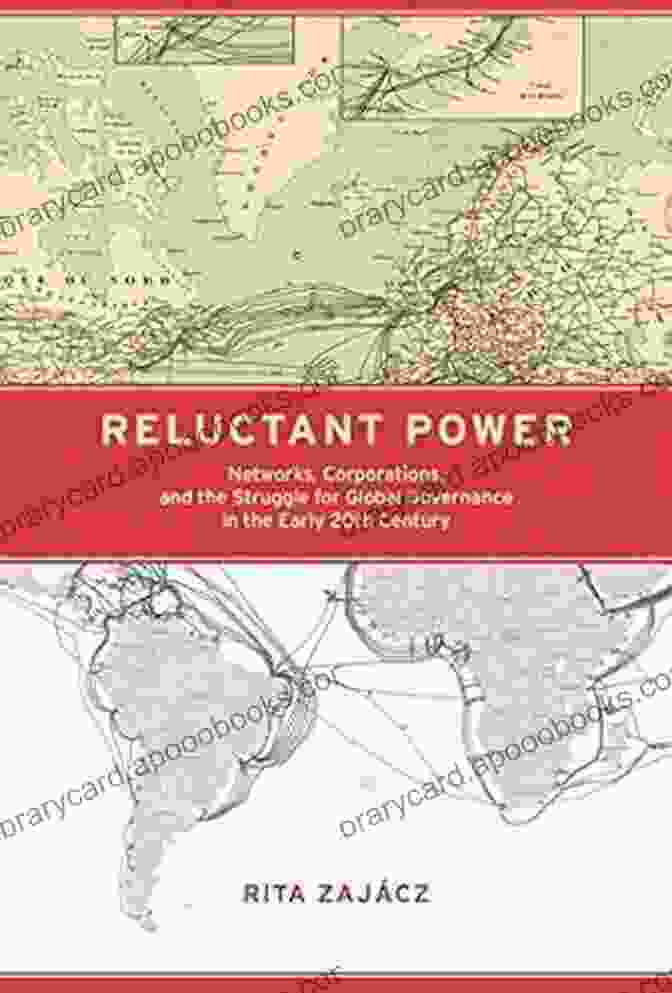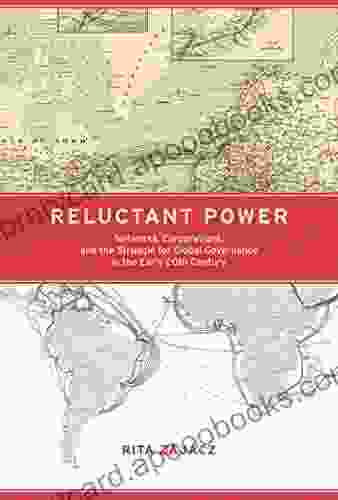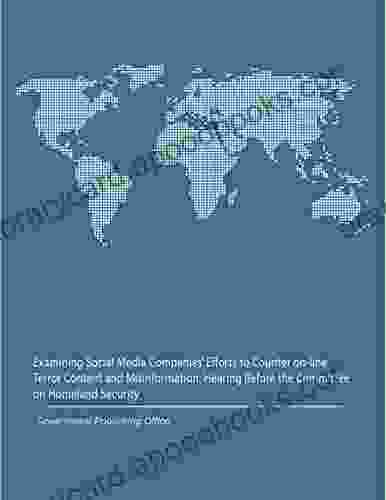Networks, Corporations, and the Struggle for Global Governance in the Early 20th Century: Unraveling the Hidden Web of Power and Influence


As the 20th century dawned, the world witnessed a profound transformation in the global landscape. The emergence of multinational corporations, coupled with the rise of international organizations, ushered in an era of unprecedented interconnectedness and interdependence. Amidst this evolving tapestry of power and influence, a fierce struggle for global governance ensued.
5 out of 5
| Language | : | English |
| File size | : | 4086 KB |
| Text-to-Speech | : | Enabled |
| Screen Reader | : | Supported |
| Enhanced typesetting | : | Enabled |
| Word Wise | : | Enabled |
| Print length | : | 372 pages |
This article delves into the intricate web of networks, corporations, and governments that shaped the early 20th century's quest for global governance. By exploring the interplay between these entities, we uncover the hidden dynamics that influenced the course of international relations and the fate of nations.
The Rise of Multinational Corporations
The early 20th century marked a surge in the growth and influence of multinational corporations. Industrial giants such as Standard Oil, Ford Motor Company, and Royal Dutch Shell extended their reach beyond national bFree Downloads, establishing a global footprint that defied traditional notions of sovereignty.
These corporations possessed immense economic power, controlling vast resources and wielding significant sway over international markets. Their ability to transcend national boundaries and operate on a global scale provided them with unprecedented leverage in shaping the global Free Download.
The Emergence of International Organizations
Alongside the rise of multinational corporations, the early 20th century also witnessed the emergence of international organizations. The League of Nations, founded in the aftermath of World War I, aspired to be a forum for resolving international disputes and promoting peace.
Other international organizations, such as the International Labour Organization and the Permanent Court of International Justice, addressed specific global issues, such as labor rights and the peaceful settlement of international conflicts.
The Struggle for Global Governance
The interaction between multinational corporations and international organizations set the stage for a fierce struggle for global governance. Corporations sought to protect and expand their economic interests, while international organizations aimed to regulate their activities and promote international cooperation.
This struggle manifested in various forms, including:
* Competition for Influence: Corporations and international organizations competed for the allegiance of governments and the support of public opinion. * Regulatory Conflicts: International organizations attempted to impose regulations on multinational corporations, leading to clashes over sovereignty and national interests. * Economic Diplomacy: Corporations used their economic might to influence the policies of governments and international organizations.
Key Networks and their Influence
Within this complex landscape, several key networks emerged, playing a pivotal role in shaping the struggle for global governance:
* The Bilderberg Group: A secretive annual conference that brought together elite politicians, industrialists, and intellectuals to discuss global affairs. * The Council on Foreign Relations (CFR): A U.S. think tank that provided a platform for policymakers and business leaders to engage in international dialogue. * The International Chamber of Commerce (ICC): A global business organization that represented the interests of multinational corporations.
These networks served as conduits for information exchange, coordination, and influence, enabling their members to shape the course of global governance.
Case Studies:
The Baku Oil StrikeThe Baku oil strike of 1920 exemplifies the interplay between multinational corporations and international organizations. When Azerbaijani oil workers went on strike against British-owned Royal Dutch Shell, the League of Nations intervened to mediate the conflict. However, the League's efforts were hampered by political and economic pressures from both sides.
The Havana Sugar AgreementThe Havana Sugar Agreement of 1937 illustrates the role of international organizations in regulating multinational corporations. The agreement aimed to stabilize global sugar prices and prevent overproduction. However, it was challenged by corporations that sought to maximize their profits.
The struggle for global governance in the early 20th century was a complex and multifaceted affair. The emergence of multinational corporations and international organizations created a new global landscape, where power and influence were wielded by a diverse array of actors.
Networks and alliances played a pivotal role in shaping the outcomes of this struggle, enabling corporations, governments, and international organizations to pursue their often-divergent agendas. By unraveling this hidden web of power, we gain a deeper understanding of the forces that shaped our interconnected world.
As we navigate the complexities of the 21st century, the lessons learned from this historical struggle remain relevant. The quest for global governance continues, requiring a delicate balance between the interests of corporations, governments, and the international community. By understanding the historical dynamics that have shaped our global Free Download, we can better appreciate the challenges and opportunities that lie ahead.
5 out of 5
| Language | : | English |
| File size | : | 4086 KB |
| Text-to-Speech | : | Enabled |
| Screen Reader | : | Supported |
| Enhanced typesetting | : | Enabled |
| Word Wise | : | Enabled |
| Print length | : | 372 pages |
Do you want to contribute by writing guest posts on this blog?
Please contact us and send us a resume of previous articles that you have written.
 Book
Book Novel
Novel Page
Page Chapter
Chapter Text
Text Story
Story Genre
Genre Reader
Reader Library
Library Paperback
Paperback E-book
E-book Magazine
Magazine Newspaper
Newspaper Paragraph
Paragraph Sentence
Sentence Bookmark
Bookmark Shelf
Shelf Glossary
Glossary Bibliography
Bibliography Foreword
Foreword Preface
Preface Synopsis
Synopsis Annotation
Annotation Footnote
Footnote Manuscript
Manuscript Scroll
Scroll Codex
Codex Tome
Tome Bestseller
Bestseller Classics
Classics Library card
Library card Narrative
Narrative Biography
Biography Autobiography
Autobiography Memoir
Memoir Reference
Reference Encyclopedia
Encyclopedia Robert L Bryan
Robert L Bryan Andi Rhodes
Andi Rhodes Fabrizio Frosini
Fabrizio Frosini Chris Saade
Chris Saade Madeleine Westerhout
Madeleine Westerhout Amanda Desiree
Amanda Desiree Gauranga Darshan Das
Gauranga Darshan Das Robert A Birmingham
Robert A Birmingham Amy J Mazur
Amy J Mazur Mary Ellen Snodgrass
Mary Ellen Snodgrass Spencer Wilson
Spencer Wilson David Woodsfellow
David Woodsfellow Vi Zetterwall
Vi Zetterwall Max Ciampoli
Max Ciampoli Amanda Baker
Amanda Baker Harold M North
Harold M North Dr G J Sabongi
Dr G J Sabongi Jerry Jennings
Jerry Jennings Owen Lowery
Owen Lowery Anita Diamant
Anita Diamant
Light bulbAdvertise smarter! Our strategic ad space ensures maximum exposure. Reserve your spot today!

 Scott ParkerNemesis Rising: Join The League of Extraordinary Villains in a Gripping Epic...
Scott ParkerNemesis Rising: Join The League of Extraordinary Villains in a Gripping Epic...
 Davion PowellUnveiling the Islamic Father of Social Science: Lessons from Ibn Khaldun's...
Davion PowellUnveiling the Islamic Father of Social Science: Lessons from Ibn Khaldun's...
 Cade SimmonsExplore the Timeless Charm of "The Two Gentlemen of Verona": A Journey into...
Cade SimmonsExplore the Timeless Charm of "The Two Gentlemen of Verona": A Journey into... Calvin FisherFollow ·2.4k
Calvin FisherFollow ·2.4k Thomas PynchonFollow ·11.1k
Thomas PynchonFollow ·11.1k Kendall WardFollow ·15.7k
Kendall WardFollow ·15.7k Marcel ProustFollow ·7.1k
Marcel ProustFollow ·7.1k Beau CarterFollow ·7.5k
Beau CarterFollow ·7.5k Don ColemanFollow ·4.2k
Don ColemanFollow ·4.2k Giovanni MitchellFollow ·10.2k
Giovanni MitchellFollow ·10.2k Deacon BellFollow ·15.2k
Deacon BellFollow ·15.2k

 Roald Dahl
Roald DahlImmerse Yourself in a Mesmerizing Tapestry of Creativity:...
Prepare to be captivated by "Spectra," an...

 Clarence Brooks
Clarence BrooksUnleash Your Inner Taylor with Red Piano Vocal Guitar:...
Embrace the Red Era...

 Jeffrey Hayes
Jeffrey HayesUnlock Your Child's Academic Potential: A Comprehensive...
In today's rapidly changing...

 William Golding
William GoldingBrave Elizabeth: A Captivating Tale of Resilience and...
Immerse Yourself in a Riveting Historical...

 Curtis Stewart
Curtis StewartUnveiling the Heartfelt Melodies of Taylor Swift: A...
Step into the enchanting world of Taylor...
5 out of 5
| Language | : | English |
| File size | : | 4086 KB |
| Text-to-Speech | : | Enabled |
| Screen Reader | : | Supported |
| Enhanced typesetting | : | Enabled |
| Word Wise | : | Enabled |
| Print length | : | 372 pages |








